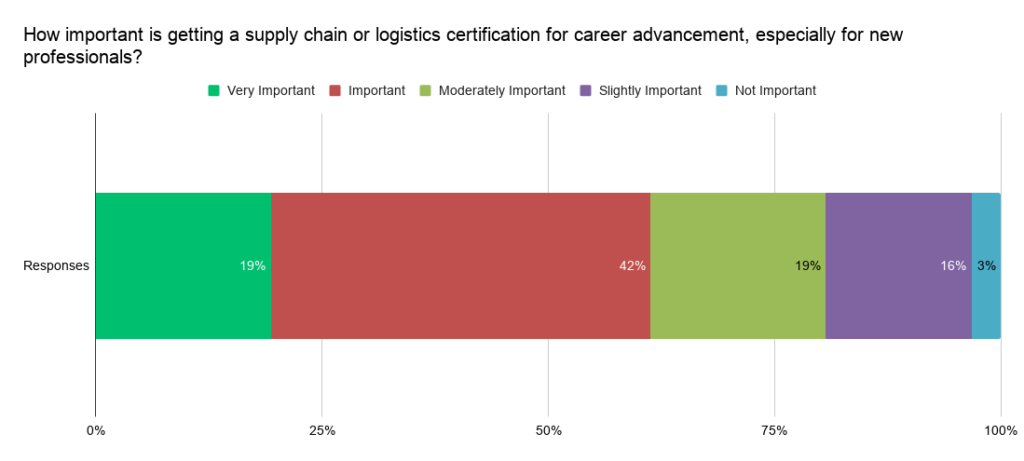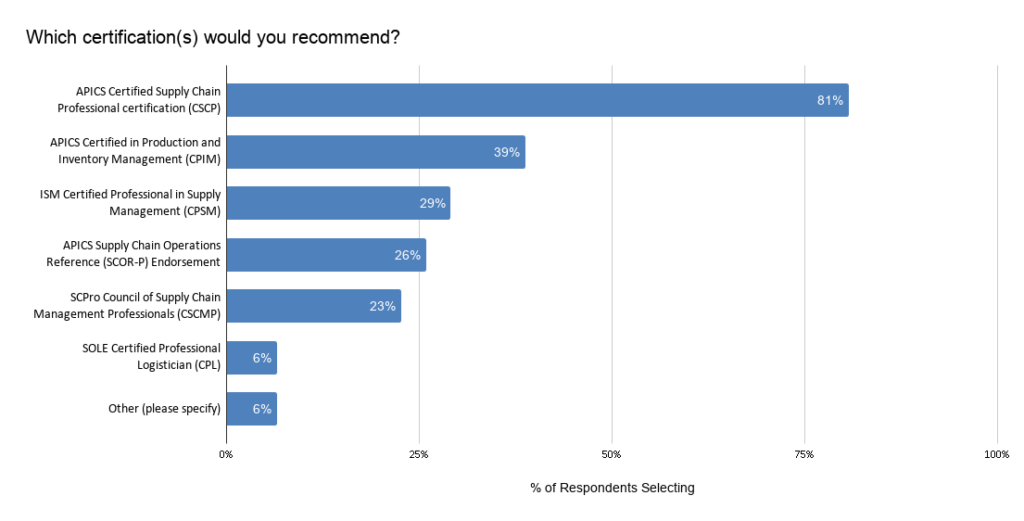There are various supply chain and logistics certifications that industry professionals can pursue from APICS, ISM, CSCMP, and other organizations. Is getting a certification important for career advancement, especially for new supply chain professionals? Which certification would you recommend?
We asked our Indago research community for their perspective on this topic. A majority (61%) of our member respondents said that getting a supply chain or logistics certification is “Important” or “Very Important” for career advancement, especially for new professionals. Less than 20% said that it was “Slightly Important” or “Not Important.”

An overwhelming majority of the respondents (81%) recommend APICS Certified Supply Chain Professional (CSP) certification, with APICS Certified in Production and Inventory Management (CPIM) ranking second with 39% of the respondents recommending it.

Overall, the respondents were generally positive about the value of certifications, especially for professionals who are new to the discipline or didn’t study supply chain management in college. Here’s one example:
“I have received the following certifications from APICS (ASCM): CSCP, CLTD, CPIM, and SCOR-P Endorsement. I feel that achieving certification, especially after being removed from school for a period of time, reflects your willingness to advance yourself. CSCP is a good one to go after because it addresses the supply chain end-to-end, while CPIM and CLTD focus on the front end and back end, respectively. SCOR-P enables you to learn how to analyze your company’s processes and benchmark them against [similar] companies. [Obtaining certifications] is keeping yourself relevant and up to date.”
Here are some other value-added comments from our Indago members, who are all supply chain and logistics professionals from manufacturing, retail, and distribution companies:
“Although I never went through any supply chain certification program, I had colleagues who did. You could tell that [what they learned] to obtain the certification expanded their field of vision outside their particular area and enabled them to brainstorm more innovative solutions to challenges.”
“Supply Chain is such a broad spectrum that touches just about every function in a business…After 15 years in industry, I completed CSCP certification. It was really a validation of my real-world experience, as well as an overview of areas that I knew of in theory [but didn’t have] direct working experience… [Certifications can also provide] a great introduction to understanding forecasting, macro planning, scheduling, supply chain finance, etc.”
“I think certifications are becoming watered down…They need to better outline what the certification will immediately enhance, how it will get you to think strategically, and how the courses are differentiated for new and more senior-level supply chain professionals. My advice is to pursue those projects and opportunities at work to gain experience. If this is not an option, then look to gain certifications.”
“Certifications are beneficial for individuals getting into a SCM career. The goal of certifications is to show [your] aptitude and understanding of the multiple scenarios you will face on a consistent basis. However, what is most critical is [your] willingness to go beyond the expected to properly analyze, adapt, and expand on the basics of SCM. A certification can get you in the door of a career, but what you do with your [learnings to bring] SCM to a whole new level is what will keep you ‘in the door’ with upward mobility.”
What is your experience or perspective related to supply chain certifications? What benefits, if any, do they provide? Are there other programs you would recommend? Post a comment and share your perspective!
Join Indago
If you’re a supply chain or logistics practitioner from a manufacturing, retail, or distribution company, I encourage you to learn more about Indago and join our research community. It is confidential, there is no cost to join and the time commitment is minimal (2-5 minutes per week) — plus your participation will help support charitable causes like JDRF, American Logistics Aid Network, American Cancer Society, Feeding America, and Make-A-Wish.
You can also follow us on LinkedIn to stay informed of our latest research results and news.









